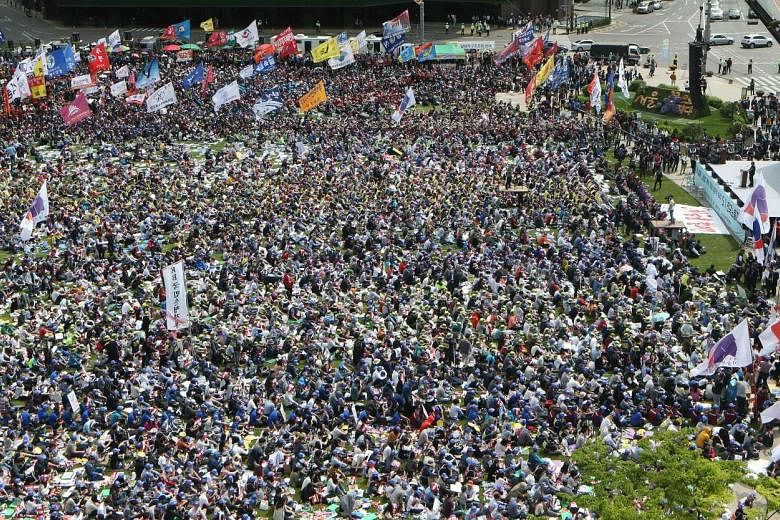SEOUL (AFP) - Tens of thousands of South Koreans took part in May Day protests on Sunday (May 1) to criticise labour reforms pushed by the government and to call for a higher minimum wage.
Labour activists say the labour reform Bill - pushed by President Park Geun Hye and her conservative Saenuri Party - will make it easier for companies to lay off workers.
"Let's fight together against the evil bill!" labour activists and unionised workers chanted in unison during a protest held in Seoul Plaza in front of the city hall.
About 30,000 unionised workers at local companies took part, according to the Federation of Korean Trade Unions.
Elections last month saw Ms Park's party lose its parliamentary majority for the first time in 16 years, as voters registered their dissatisfaction with the president's economic record and soaring youth unemployment.
The crushing defeat left Ms Park, who has less than two years left of her single, five-year term, a lame duck leader who will increasingly struggle to push through her conservative economic agenda, including labour reforms.
Many at Sunday's rally in front of the city hall waved banners reading "Down with easy layoff!" or "Protect our rights to work!" and chanted slogans including "Fight against Park's administration that suppresses labour rights!"
Many also waved giant flags reading "Minimum wage of 10,000 won($8.73)!"
South Korea's current minimum wage is 6,030 won (S$7) per hour.
Another protest involving thousands of workers was held in central Seoul, demanding the scrapping of the labour reform bill and shorter working hours.
South Korea has one of the longest working hours in the world of 2,124 hours a year, far higher than the OECD average of 1,770 hours.
The rallies were watched by tens of thousands of police officers. No clash with the police has been reported.
Last year's May Day rallies ended with violent clashes between protesters and the police, who sprayed water cannon and pepper liquid at the crowd, with dozens of participants injured.
Ms Park's administration argues the reform plan would introduce flexibility to a rigid labour market, by making it easier for businesses to hire as well as fire.

